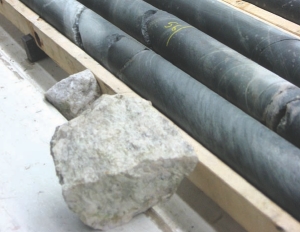Canada Lithium (CLQ-T, CLQMF-O) is gearing up to put its flagship Quebec Lithium project into production by late 2012.
The company recently completed pilot-scale tests at the past-producing deposit near Val d’Or, Que., and reported that the samples produce 99.9% battery-grade lithium carbonate. On the day of the news, the company’s shares moved up 9¢ to 70¢ on 3.2 million traded shares.
Peter Secker, company president and CEO, says the results from the pilot-scale tests illustrate that what the previous operators were doing at the deposit, which was mined as an underground operation from 1955 to 1965 for spodumene and lithium carbonate products, was correct, and the flow sheet that the company put forward duplicates what they did, and that Canada Lithium can produce battery-grade lithium carbonate.
Battery-grade lithium is technically 99.5% and above, explains Secker. “We demonstrated that we can do 99.9% and above. . . which exceeds the current specs for bat- tery-grade lithium carbonate.”
Secker points out not only does the pegmatite-based project yield a higher quality product compared to brines, which produce several by-products, such as potash and salts, before lithium, it also benefits from being able to “increase production, relatively quickly” in terms of acting to market demands. Converting spodumene to lithium carbonate takes about five days compared to the 18-month-to three-year evaporation period required by brines, notes Secker, adding a small plant expansion at Quebec Lithium would take three to six months compared to the few years that it would take for a brine producer to increase its production.
Located in the northeast corner of Lacorne Township, 60 km from the mining-friendly community of Val d’Or, the wholly-owned project hosts a resource of 31.6 million measured and indicated tonnes grading 1.11% lithium oxide and a further 38.9 million inferred tonnes of 1.12% Li2O. Earlier this year, the company released a prefeasibility study for the 4-sq.- km property, which envisioned a 2,950-tonne-per-day open-pit operation producing 19,300 tonnes of lithium carbonate a year (from 15 million tonnes of ore over a 15- year period).
Currently, Canada Lithium is working on a feasibility study, which it expects to tick off its to-do list by the end of this year. The company plans to start building the open-pit mine and processing plant by May 2011 with a goal of bringing production online in late 2012.
“The challenges are more physical than anything else,” says Secker of the company’s progress, adding that Canada Lithium could be the first new North American producer to put a hard rock lithium deposit into production.
In terms of end users, Secker says there are synergies with end users in Quebec and the United States, with Phostech Lithium, a subsidiary of the German-based company Sud-Chemie, set to build a lithium iron phosphate plant near Montreal and the Obama administration funding several plants that plan to make advanced batteries in the United States. This gives the company, Secker says, a “significant competitive advantage supplying to them rather than coming out of South America.”
Canada Lithium has also signed a marketing agreement with Mitmore sui, a large trading house based in Japan, which has the rights to market a portion of its products in China, Korea and Japan.
The company has 150 million shares outstanding and a 52-week trading range of 36¢-74¢.


Be the first to comment on "Quebec Lithium lifts Canada Lithium shares (October 18, 2010)"